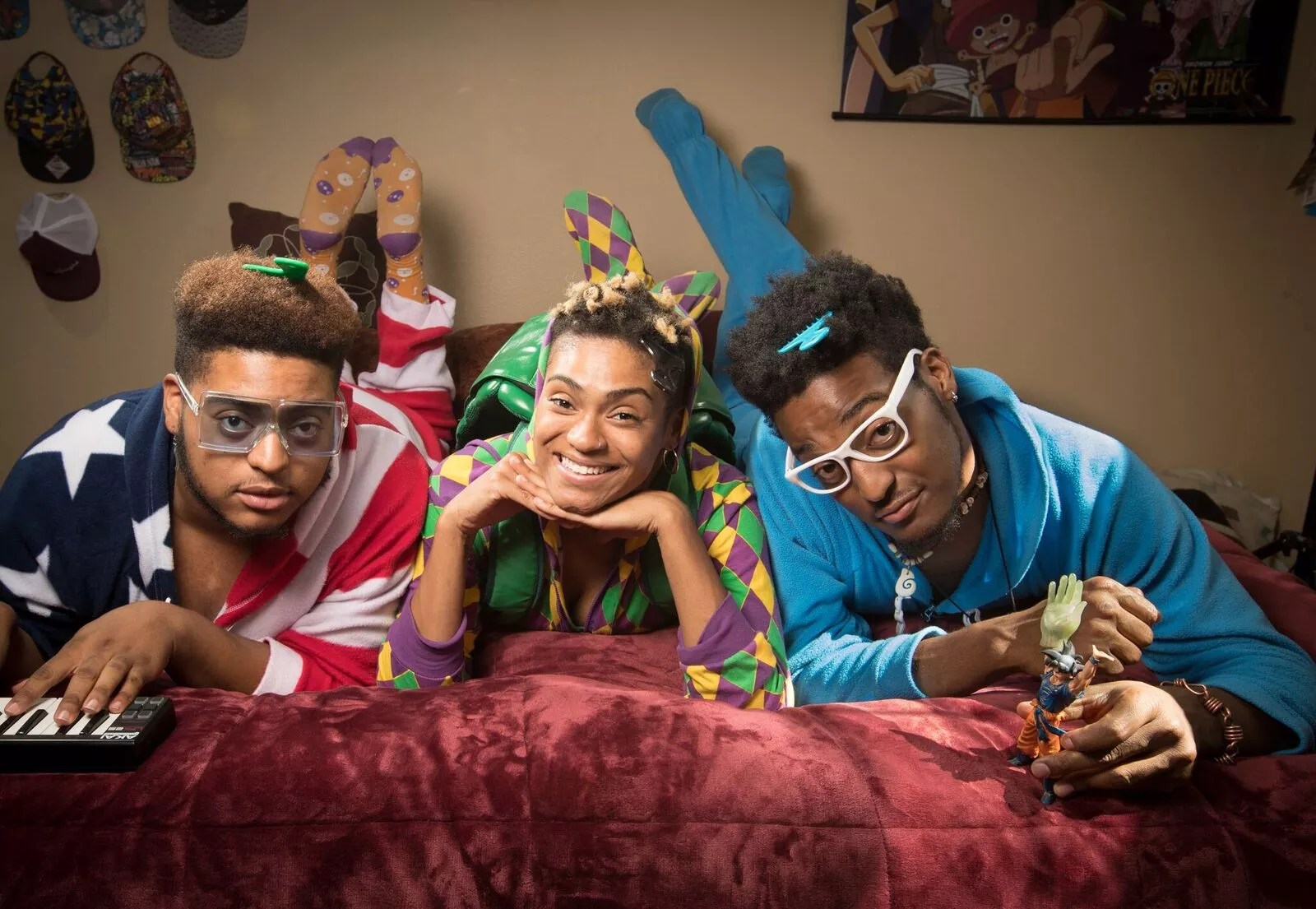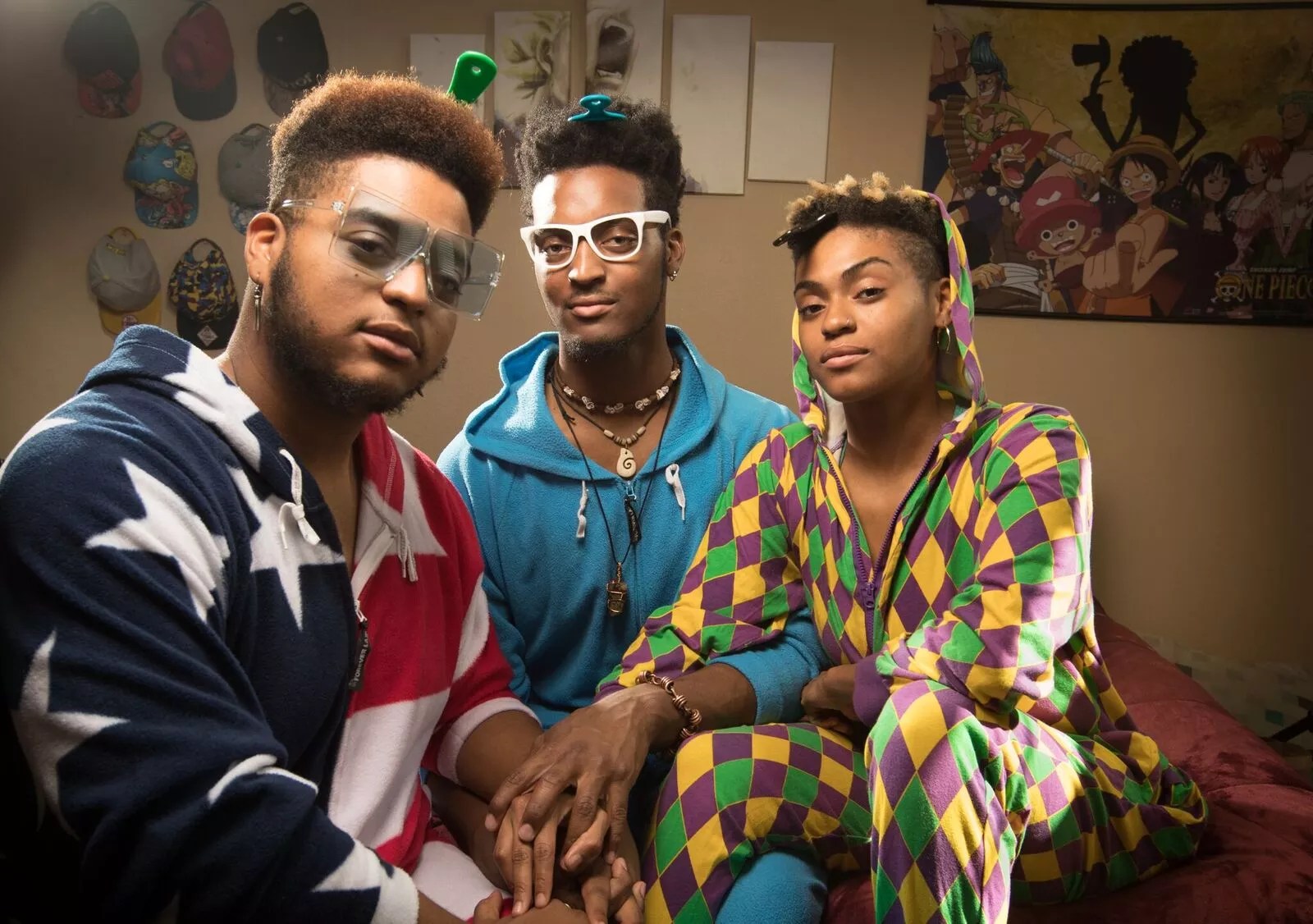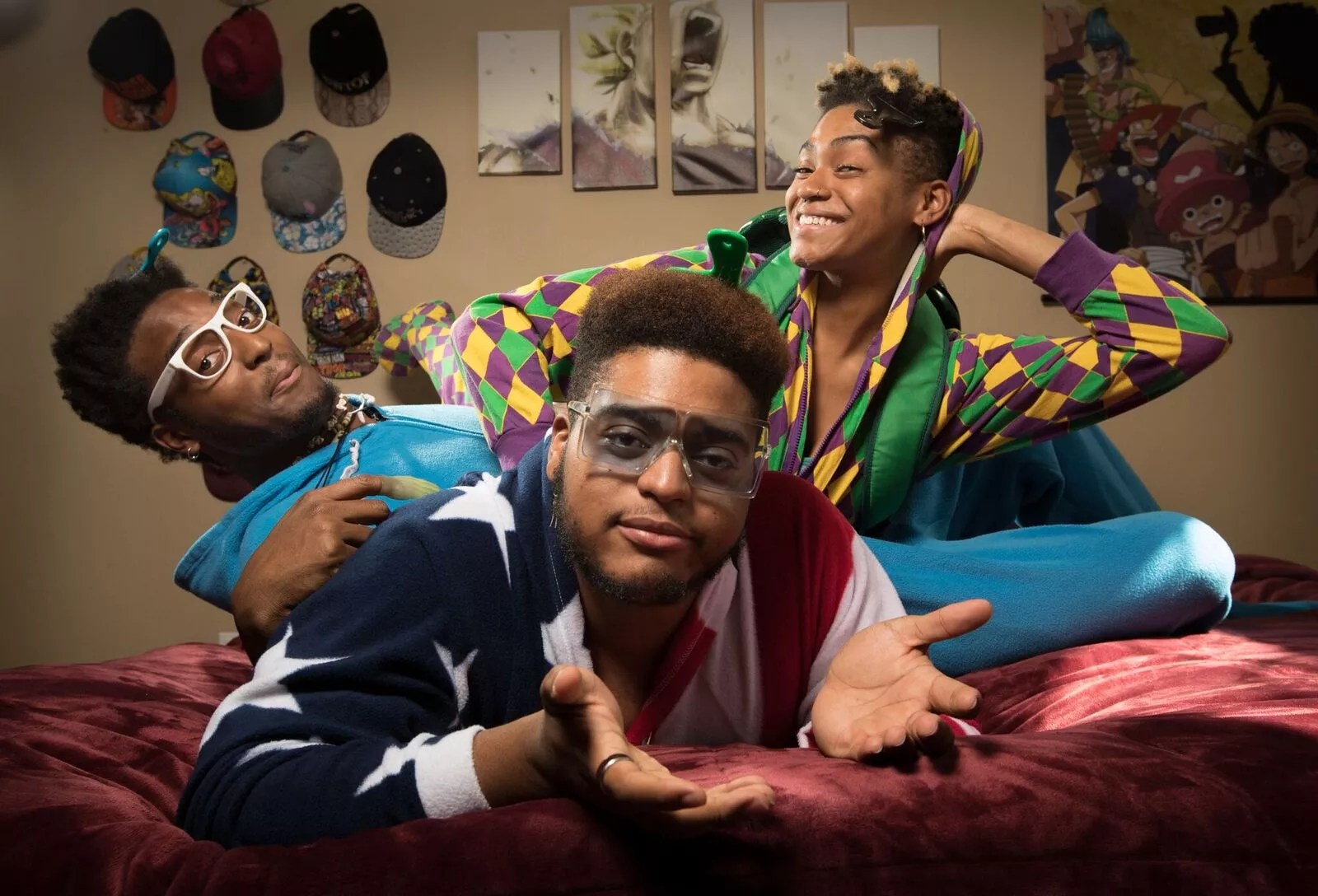
Exploredinary

Audio By Carbonatix
There’s hardly any corner of the local music scene that’s not connected to the Grays. Almost literally. Pull on any cable on any random stage in town and at its end is likely to be one of the three Gray siblings: singer Kierra, who’s 27, 25-year-old bass player KJ and keyboardist Kwinton, 23.
The trio sits in their onesie pajamas eating giant burritos in bed, with munchies no doubt brought on by the aromatic smoke they’re partaking in while sitting in Kwinton’s bed in his family’s home in Plano. They may be on a break between photo shoots, but the image is hardly staged. The Grays own several pairs of colorful onesies, and together they’re in a perpetual musical comedy, giddy and unjaded by (showbiz) life, like the Von Trapps in simpler times.
They’ve spent nearly every second of their lives together, all born in Dallas and home-schooled by their mother (as KJ says, “All the way to college”) because she was already watching other kids at home.
“We all got in a decent amount of trouble, but it was probably me,” KJ says, admitting that he was the prime troublemaker in their shared youth, describing a scientific love for unscrewing things that didn’t belong to him. “I just so happened to be a master of getting into something.”
Kierra is the only one who’s ever seen the inside of a classroom as a school-age student.
“They never went to actual school,” she says of her brothers. “I went to private school in kindergarten and first grade.”
KJ and Kwinton laugh at the fanciness implicit in her “higher education.”
They say they didn’t miss out on common school activities like, say, going to prom or getting bullied.
“We were bullied enough having Kierra as an older sister,” KJ says jokingly. “She was bigger than us for the longest time, and she would throw her weight around.”
They participated as a group in talent shows when they were little, while wearing matching outfits.
“We were always in matching outfits,” KJ says, explaining that it was a preventive method rather than branding. “It was easier, with three kids running around, if one of us got away to say, ‘OK, they’re dressed exactly like this and they all have the same face.'”
“We were always in matching outfits. It was easier, with three kids running around, if one of us got away to say, ‘OK, they’re dressed exactly like this and they all have the same face.’” – KJ Gray
Despite their ages, the conversation often touches on a particular ’90s nostalgia, like when they speak about burning through their VHS copy of The Lion King. The Grays spent a lot of their shared time figuring out how to play music.
“That language,” Kwinton says, “you can speak it without knowing how to write it. Like Stevie Wonder. We literally learned watching Disney films. We had instruments and we could press on things until they matched.”
They learned to navigate the complexities of socialization through their involvement in church. It was a small one, they say, the kind where everyone knew each other’s sins.
“That was our social place to understand the world and have experiences,” Kierra says.
They learned more than Christian lore, presented with the tools of what would become the family trade – all three joined the puppet production team. Kierra ran sound, and eventually they became part of their church’s band.
“All those little experiences were kind of setting us up to be able to do anything entertainment-wise once we got older,” Kierra says. “We had been schooled in a different way.”
It was through their church in Denton that Kierra recorded her first single, a gospel song, at age 14, for which she won an award for songwriting from the Gospel Music Association and free admission to its conference in Nashville.

Exploredinary
“I was the first to do music outside of the family and outside of the house,” she says. “I then won this award, and I was like, ‘Oh, shit, I guess I know how to speak this language.'”
Growing up, they had to memorize a lot of changing addresses.
“We bounced around the metroplex a decent amount,” Kierra says.
“A change of scenery,” KJ jokes.
Kwinton studied music at Eastfield Community College for music but struggles to recollect the outcome.
“Did I graduate?” he wonders out loud, as his siblings laugh. “I think I did. I got my associate’s.”
KJ studied civil engineering but dropped out. He now lives in downtown Dallas with his “lady” and a cousin. Kierra moved to Denton for two years as a journalism undergrad at the University of North Texas but moved back home upon graduation to help raise her two adoptive sisters, now 11 and 12, who have lived with them since they were toddlers.

Exploredinary
Their father, like their mother currently, works in real estate and gave up his musical dreams early on to raise his family. As he works in his downstairs office, he’s unaware of the endless praises sung upstairs in his honor by his offspring (and unquestionably some of the city’s finest). KJ says his father worked 90 hours a week, sometimes in three or four jobs, yet always found time to spend with his children.
Mr. Gray made a point of fine-tuning their ears, and he supplied them with instruments as well as the assurance that they’d one day become musicians.
“They didn’t necessarily have the freedom to pursue music,” Kierra says of their parents. “My dad wasn’t encouraged to do so; that wasn’t the generation they were in. Their dream was to make it so that we could grow up with the liberties to do whatever we wanted.”
The kids didn’t think to rebel and become financiers or lawyers instead, and got to practicing Disney songs, their gospel. The Grays’ allegiance to the magical kingdom is so fierce that one can practically picture a halo in the form of Mickey Mouse ears as they speak.
“If Radio Disney existed, I’d probably still turn it on,” Kwinton says.
Kierra began getting paid to do writing sessions by the time she was 18. Kwinton started working as a full-time musician when he was 17, first traveling with a Texas country band on the weekends.
He hints that some of the venues they visited might still be rooting for the Confederacy and remembers one particular incident in a small Missouri town.
“Somebody drove by and called the guitar player – who was tatted up and in skinny jeans – a faggot,” he recalls. “And I’m like, ‘Dude, this is not the place to defend yourself,'” he says he told his bandmember. “Whatever they call me today, that’s just gonna be my name. There were 75 people at the gig in a population of 200. We’re not gonna take any chances to be prideful. Not out here.
“But you can’t call me that in Dallas,” he adds with a laugh.
The Grays say that racial influences were themes that came up often when they were starting out.
“People didn’t understand us because we grew up around black people and white people,” Kierra says, “and we liked rock music and alternative music as well as hip-hop, and even family members didn’t understand it.
“There were some hard times in the recession,” she continues, “socio-economically, and the people that you’re around when you have less monetary resources, they usually haven’t seen so much as people in the suburbs. It can be harder to make friends when you don’t fit in really either area.”
KJ cites an old saying, “Too black for the white people and too white for the black people,” and adds, “I’m just trying to live like I’m living. I think as kids we felt like that.”
“Too black for the white people and too white for the black people.” – KJ Gray
Their mother is the youngest of 12, and all their cousins were adults as they were growing up. KJ remembers one afternoon when Kwinton was sent with a group of children his age to a different room in church, but he sneaked out to rejoin his siblings in their class, barging in and complaining that “They act like little kids over there.”
“I didn’t know anybody my own age until I was grown, really,” Kwinton says.
The siblings remained inseparable and currently work together at a children’s enrichment center where they teach varied weekly classes and do summer camps and special events.
“We’re strong together,” Kierra says of their fortified and ever-expanding network. “The fact that we are all a little bit different kind of connects us all wider than we reach by ourselves.”
Every year they have a family reunion at a different destination. The last vacation took them to San Francisco and this year’s to Mexico, along with 14 family members, one of whom KJ calls a “family historian.” Through this relative’s research, they’ve uncovered their maternal ancestry leading back to a man named Thomas Sherman.
“We traced his family’s lineage all the way back to the Mayflower,” KJ relates. “He was the son of a slave owner and a slave, and he married a native American woman and had 12 kids.”
The Sunday prior, Kwinton released his debut album with the Kwinton Gray Project, a jazz-fusion band where KJ plays bass. The album, called Leap of Faith, features a few guest guitar players, including Snarky Puppy’s Mark Lettieri on two tracks.
Kwinton spent some time recently rehearsing in New York as the sole accompanist for a dance company. Earlier this year, he got a call from Janet Jackson’s musical director asking him to fill in on keys for one date in July, and then again in an Atlantic City show just last month.
“She’s really awesome,” Kwinton says of Jackson. “She’s the kindest person, always smiling. She came up and introduced herself. I had all those jitters.”
“She’s really awesome. She’s the kindest person, always smiling. She came up and introduced herself. I had all those jitters.” – Kwinton Gray
“Ms. Janet, Ms. Janet,” Kierra whispers mockingly.
“Ms. Jackson,” Kwinton corrects her. “You know that’s all I called her.”
The venues were larger than he’s accustomed to playing.
“It’s definitely nerve-racking,” he says, “but I think that’s a sign of growth. You push it to the side and realize that you’re ready to do whatever you need to be doing.”
He’s not sure if Ms. Jackson particularly enjoyed his playing.
“That’s all I know is that I was able to come back,” Kwinton says.
KJ often plays with RC Williams and other Erykah Badu band members at their Wednesday night jam in Deep Ellum.
“That’s musicianship on a different level,” he says.
KJ also answered his calling unto a different stage by becoming involved in theater. Last year he was in the band for Dallas Theater Center’s production of Hair, and he soon learned he’d end up singing the opening, “Aquarius.” As they discovered his aptitude for comedy, he was given more lines. This year, he was in Shakespeare’s The Winter’s Tale.
In April, Kierra released a pop-R&B album called Pie in the Sky. She performs under the name King Kie, which Kwinton first suggested as a joke.
“Intuitively you crown yourself as the ruler of your own existence,” she says, adding that she was apprehensive about dubbing herself as a male ruler.
“I didn’t like (the name) Queen,” Kierra says. “It didn’t resonate with me. The only reason why I felt like I couldn’t (use King) was because of gender norms, but then I was like, but why? What it really means to me personally was being at a place in my life where I was finally making the art king.”
Kierra continues songwriting for other people, and one of her songs, “Work It Out,” was performed on the Bravo show Girlfriends’ Guide to Divorce. She also does frequent studio work as a background vocalist, and has gotten performance placements, like in the Ghostbusters remake, through a collective she works with.
KJ calls Kwinton “my best friend.”
“Every time we get to play together, it’s a blessing,” he says, “and he just started to try to get his glasses game up because mine was better.

Exploredinary
“With Kierra we had that same relationship,” KJ continues, “It was me and her first. She was like my mama when she was 2. No matter what she did, if me and Kwinton were about to get in trouble, [he switches on an overly dramatic voice to imitate his sister] ‘You don’t need to be doing that, because it’s not right.'”
And concludes normally: “She was trying to protect us.”
Kwinton and Kierra call him the class clown.
“He’s the goofiest onstage,” Kierra says.
Kwinton says Kierra “has always been loving and treated everybody right, and we learned that from my parents.”
He’s quick to avert a maudlin moment with a playful jab.
“As the youngest I know they envy me sometimes,” he jokes, “but I love them and I don’t want them to feel like less.”
Despite their lifelong involvement with church, they call themselves “spiritual but not religious,” and KJ adds that he doesn’t focus on judgment but on compassion for his fellow man.
“As we got older and learned more about different religions and traveled more and seen the world,” Kierra says in agreement, “the things that you take with you are simple and they translate from religion to religion, from faith to faith, from race to race, and country to country, and it’s just the sensible golden rule: Do unto others as you’d like done to you.
“I always told them they could do anything they wanted to do,” she says of her brothers. “They’re both such sweet guys and they’re talented and I just think the world of them.”
Kwinton remembers inadvertently scaring off Kierra’s boyfriends in the past, just by his towering height.
“Me and KJ and my dad, we’re all over 6 feet,” Kwinton says.
He senses an opportunity for a greater community service.
“If you ever need me to stand as an imposing figure, we are for hire.”
KJ ponders the thought, and adds, “A gig is a gig.”